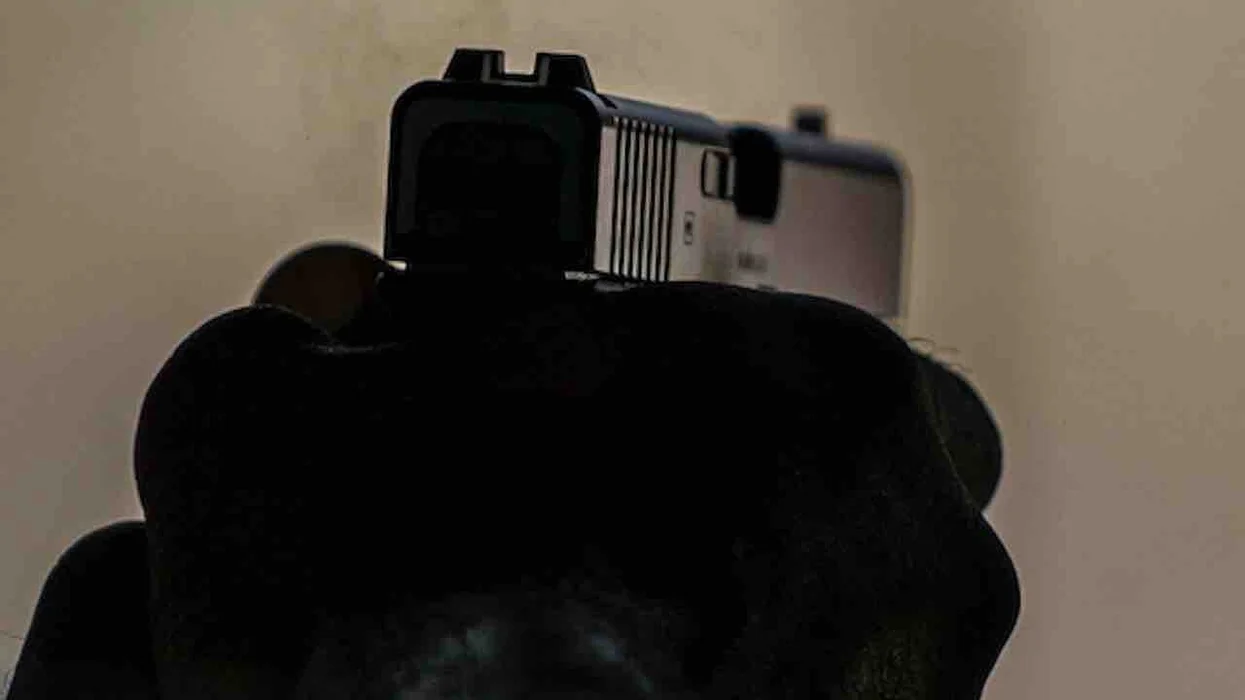
© 2025 Blaze Media LLC. All rights reserved.
Shocking levels of infiltration and U.S. ignorance.
Last week we presented an interview with Lt. Gen. Ion Pacepa, the highest-ranking Soviet bloc intel officer to ever defect. Among other stunning revelations, he put forth the theory that the Cold War had never really ended -- that Russia today is the first "intelligence dictatorship" the world has ever seen, wholly run by former KGB officers.
Perusing the stacks of New York's Strand bookstore this past weekend, we came across a book titled "On a Field of Red" from 1981 which contains a stunning revelation that serves as a book-end to Pacepa's remarks: the Cold War did not BEGIN with the end of World War II -- in fact it began in "Petrograd, during the October Revolution of 1917 when Communism emerged triumphant out of the Commencement Hall of the Smolny Institute for Young Ladies of the Nobility." Further, during World War II the U.S. Army was completely ignorant of Communist infiltration throughout Europe and even in its own ranks.

Lending credence to this notion is a letter which serves as the foreword to the book, written in late 1977, just a short time before Lt. Gen. Ion Pacepa defected to the U.S. that has seemingly been buried in the dustbins of history. The letter was written by Major General Edwin L. Silbert, the chief of intelligence during World War II, first to General of the Army Omar N. Bradley and then to General of the Army Dwight D. Eisenhower.
Here's what Silbert said, writing about the problems of counterintelligence he encountered from 1944-1946 during the Allied campaign in Northwest Europe and during the occupation of Germany [emphasis ours]:
As our intelligence operations developed, we began to see that there was an intelligence service in Europe--a substrata of society would be an accurate term for it--far more proficient and omnipresent than that of the Germans.That was the apparat of the old Communist International, which Lenin formed back in 1919 to spread the world revolution of the proletariat. Those apparats were everywhere, even in our own ranks and those of the Allied armies.
[instory-book ISBN="9780399125423"]
It was plain to me that the members of the apparats were loyal not to their own leaders or capitals but to Stalin and the Kremlin.
They became a matter of concern to me because they were armed, disciplined, and experienced underground fighters. We had to consider the possibility that if there was a war between Russia and the United States at the conclusion of World War II, as many thought there would be, we would find these people fighting us in our rear as they had fought the Germans.
I brought the matter to the attention of both Bradley and Eisenhower, and Bradley asked me to prepare a paper on the subject of the Communist International in a hurry. I gave the problem to my chief of counterintelligence, but when we began to look for people who knew anything about this phenomenon, we found that there was nobody in the higher command who knew very much about the International.
In the end, we had to go to British intelligence and to the records of the German intelligence services and to employ two Belgian trade unionists who were familiar with the problem. We had four million men, and we could find not one who could write a five-page report on the International.
Well, the report was prepared, and we paid for it, but when I put the bill in to the fiscal people, they wrote back to ask me why I had found it necessary to make a report on an Allied organization!
Stated differently, the U.S. military was seemingly completely unaware of the fact that Communist agents had infiltrated not only all of Europe, but its own forces, imbued with an allegiance to Stalin and the goal of radical overthrow of the world capitalist order.
The book, written by historian Anthony Cave Brown and former Chief Deputy Historian of the U.S. Army Charles B. MacDonald, relied heavily on previously classified and unexploited files of the intelligence and counterintelligence bureaus of the U.S., and a large collection of private and official papers assembled by Major-General William "Wild Bill" Donovan, the first head of the OSS, predecessor to the CIA.
Recent books examining unredacted World War II-era intelligence documents have shed light on the shocking levels of Communist infiltration during this time, from M. Stanton Evans and Herbert Romerstein's "Stalin's Secret Agents: The Subversion of Roosevelt's Government" to Blaze contributor Diana West's controversy-inducing "American Betrayal." But we had not previously seen light shed on this Silbert letter.
Numerous intelligence documents from the Cold War era dating back to World War II continue to remain encrypted (see the Venona project for example).
Want to leave a tip?
We answer to you. Help keep our content free of advertisers and big tech censorship by leaving a tip today.
Want to join the conversation?
Already a subscriber?
Ben Weingarten is a writer, commentator, and editor at large at RealClearInvestigations. He is a senior contributor at the Federalist and writes columns for Newsweek and the Epoch Times.
Ben Weingarten
Ben Weingarten is a writer, commentator, and editor at large at RealClearInvestigations. He is a senior contributor at the Federalist and writes columns for Newsweek and the Epoch Times.
more stories
Sign up for the Blaze newsletter
By signing up, you agree to our Privacy Policy and Terms of Use, and agree to receive content that may sometimes include advertisements. You may opt out at any time.
Related Content
© 2025 Blaze Media LLC. All rights reserved.
Get the stories that matter most delivered directly to your inbox.
By signing up, you agree to our Privacy Policy and Terms of Use, and agree to receive content that may sometimes include advertisements. You may opt out at any time.




